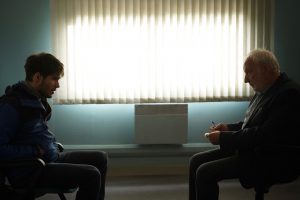‘Someone Somewhere’ helps us to find others by finding ourselves
“Someone Somewhere” (“Deux moi”) (2019 production, 2020 release). Cast: François Civil, Ana Girardot, Camille Cottin, François Berléand, Simon Abkarian, Eye Haidara, Rebecca Marder, Pierre Niney, Paul Hamy, Maria Bunel, Patrick d’Assumçao, Vincent Scalera, Emmanuelle Bouaziz, Quentin Faure, Jeanne Arènes, Michel Lerousseau, Dady Saint-Thomas, Jessé Rémond Lacroix, Hamza Ouechtati. Director: Cédric Klapisch. Screenplay: Santiago Amigorena and Cédric Klapisch. Web site. Trailer.
Being alone can be one of the most heart-wrenching experiences any of us can endure. The sense of loneliness frequently weighs heavily on us when we’re uninvolved; the lack of attachment, of connection, eats away at us and leaves us emotionally empty. What’s often worse, though, is having such an experience and not even realizing why we feel the way we do – or that it even might matter, not only in terms of companionship, but also what it could do to us as individuals. So it is for a pair of lonely young Parisians seeking to find themselves – and their destiny – in the insightful new French romantic comedy, “Someone Somewhere” (“Deux moi”).
Warehouse worker Rémy Pelletier (François Civil) and cancer researcher Mélanie Brunet (Ana Girardot) lead remarkably parallel lives but without knowing it. They live side by side in adjacent buildings on the same Parisian street. They both suffer from unexplained sleep issues (Rémy an insomniac, Mélanie a hypersomniac). They each often find themselves lost for words to explain their feelings or their sense of self. They even cross paths with one another, without recognition, on the street, at the local grocery store and in the neighborhood pharmacy. It’s almost as if they’re invisible to one another, despite their many commonalities.

Parisian singles Rémy Pelletier (François Civil, left) and Mélanie Brunet (Ana Girardot, right) lead parallel lives, and they even cross paths often, but nearly always without recognition, as seen in the new French romantic comedy, “Someone Somewhere” (“Deux moi”). Photo by Emmanuelle Jacobson-Roques, courtesy of Distrib Films US.
But, despite their many mutual qualities and experiences, the most significant trait Rémy and Mélanie share is an ill-defined sense of being unsettled. This restlessness may help to explain the sleep disorders to a certain extent, but, as they slowly come to discover, those maladies are symptomatic of something deeper, feelings that need to be probed and unearthed if those lonely souls are ever to get any satisfaction (not to mention a good night’s rest). And it’s something that needs to be addressed sooner rather than later, for it’s beginning to affect other areas of their lives: Mélanie’s job performance starts to suffer, and Rémy experiences a health scare when he passes out on a Paris subway from a sudden and unexpected panic attack. As a consequence, they both begin seeing psychiatrists to help them sort out their issues – and to help them get past their respective bouts of despair.
Mélanie’s weariness, as it turns out, stems from her unresolved grief over the loss of her relationship with Guillaume (Quentin Faure), a boyfriend she adored and with whom she thought she would spend her life. However, as her therapist (Camille Cottin) helps her discover, Mélanie has not given herself permission to let go of the hurt and move on. She also learns that, if she’s ever going to be happy in another romantic involvement, she needs to place her own needs on the same level as those of a partner, to give up being a perpetual people-pleaser, to recognize that she deserves to be just as happy as the recipient of the love and affection she so freely gives. But, to get the ball rolling toward such a goal, Mélanie also needs to take steps to get herself back in the game, to try her hand at meeting others and dating again – provided that she keeps the foregoing considerations in mind.

The guidance of a helpful therapist (Camille Cottin) proves beneficial to a young patient afflicted with a sleep disorder and other issues in the new French romantic comedy, “Someone Somewhere” (“Deux moi”). Photo by Emmanuelle Jacobson-Roques, courtesy of Distrib Films US.
Rémy’s circumstances prove to be more of a conundrum, and the somewhat cryptic tactics used by his therapist (François Berléand), at least initially, don’t make solving this puzzle any easier. On some level, though, Rémy’s counselor recognizes that his patient’s case is a tougher nut to crack, given that he doesn’t appear to have a clue what the underlying issue is. Rémy is single and hasn’t dated anyone for some time, so there’s no apparent relationship baggage. His work life is going well, and he’s even been the recipient of a recent promotion. He also has a co-worker, Djena (Eye Haidara), who seems to be showing some interest in him, at the very least as a friend, if not more. In fact, if anything, he seems to be faring better than most everyone else around him.
So what’s at the heart of Rémy’s story? That’s what he needs to figure out, something for which he needs to dig deep to find resolution. And, in all likelihood, that explains his therapist’s enigmatic approach; he knows that Rémy will need to find his own answers, and, to do that, he’s also aware that his patient will need to do his own work. If he were to attempt to spoon-feed the answers to Rémy, the impact of the explanation for his situation wouldn’t be nearly as revelatory – or as powerful.
As Mélanie and Rémy set off on their respective journeys of personal discovery, not all of the advice they receive comes from their psychiatry sessions. They also get more than their share of good practical guidance from Mansour (Simon Abkarian), the owner of the neighborhood grocery store. That everyday support runs the gamut of subjects, from cat food recommendations to entertainment suggestions to thoughts on what makes life worth living. Mansour thus serves as a sort of real world sage, an effective counterpart to his clinical peers who unwittingly but decidedly helps steer his clients toward happiness, even if in his own small but special way.

After an unexpected panic attack, warehouse worker Rémy Pelletier (François Civil, left) consults a therapist (François Berléand, right) to help him discover the cause in the new French romantic comedy, “Someone Somewhere” (“Deux moi”). Photo by Emmanuelle Jacobson-Roques, courtesy of Distrib Films US.
By now, you might be wondering how all of this makes “Someone Somewhere” a romantic comedy. Well, that’s what viewers, like the protagonists, will have to find out for themselves. Despite the seeming seriousness of this story, it’s full of plenty of laugh-out-loud moments, and there’s more than a little romance involved, even if it doesn’t necessarily take the form one might expect. But, trust me, all of these narrative elements do tie together, making for a thoughtful, insightful, genre-busting romantic comedy that pleases in highly unusual and extremely satisfying ways. Be aware, though, that you’ll have to exercise some patience in getting to the payoff, a quality that, in itself, poetically reinforces the whole point of the movie.
As the film’s narrative suggests, there’s a lot going on beneath the surface in this picture, and that’s quite fitting when it comes to its philosophical underpinnings, most notably those that relate to the conscious creation process, which maintains we draw upon the power of our thoughts, beliefs and intents in manifesting the reality we each experience. That becomes more than apparent in the character of the lives led by Rémy and Mélanie. And, even if they’re personally unaware of this philosophy’s principles, they nevertheless practice them – for better or worse – in shaping their respective existences.
From the nature of this story, however, it’s also obvious that they’re not especially happy with their circumstances. That’s because neither of them is realistically in touch with their thoughts, beliefs and intents. It’s what makes Mélanie wonder why she’s a hypersomniac and why Rémy is unable to effectively describe himself, something that occurs repeatedly throughout the film. Thus, the first step each of them must take is identifying the motivations that drive them so that they can see how they translate into the manifestations that surround them.

Mansour (Simon Abkarian), owner of a neighborhood Parisian grocery store, doles out pearls of wisdom to his customers on a variety of subjects in director Cédric Klapisch’s latest offering, “Someone Somewhere” (“Deux moi”). Photo by Emmanuelle Jacobson-Roques, courtesy of Distrib Films US.
An important aspect of this is being authentic with themselves. That, however, may be easier said than done. For example, it can be all too easy to be in denial about what we think and feel, making it possible to fudge the truth and deceive ourselves, and that explanation is frequently floated as a likely cause in situations such as this. But there may be a simpler explanation behind this – we just may not know what drives us and the subsequent creation of our reality. When that’s the case, as it seems to be with Rémy and Mélanie, getting the process off the ground can be especially difficult, because one doesn’t have a clue where to begin, let alone know how to proceed.
That’s where the counselors – both formal and informal – come into play. They serve as sounding boards, helping their patients find ways to gain traction in discovering their authentic selves. And, in their own way, that’s probably why Rémy and Mélanie drew these professionals into their lives in the first place. Having no idea how to get started and having had no previous experience dealing with therapists, they needed to try something different to help them get off the dime. Launching the process in this way may take some time, and progress might be slow, but, if it gets things moving when nothing else does, then it’s likely worth the effort, especially when results begin to materialize.
Once armed with this information, it then becomes possible to pinpoint the items of satisfaction and discontent in our reality. And, knowing that our thoughts, beliefs and intents shape what manifests, it’s also possible to rewrite the existing notions to improve the nature of the resulting existence. By eliminating what doesn’t work and replacing those dysfunctional elements with new ones that do, we can mold a new framework, create a new template for the reality we would like to experience.

When a new co-worker comes to her department, CSR Djena (Eye Haidara) takes an interest in him that may involve something more than just friendship in the new French romantic comedy, “Someone Somewhere” (“Deux moi”). Photo by Emmanuelle Jacobson-Roques, courtesy of Distrib Films US.
That’s the odyssey Rémy and Mélanie embark upon through their counseling experience. When answers begin to emerge regarding their personal dissatisfaction, their sleep disorders and other issues, they have opportunities to turn matters around. And it’s truly astounding what those changes can accomplish, both in the areas of immediate concern, as well as in others that may not have been considered. That can open up tremendous new vistas for unexpected and remarkably fulfilling new destinies.
In bringing about such outcomes, there are inevitably clues that appear along the way, leading us in the direction of those new futures. Those clues frequently take the form of synchronicities, those astonishing “coincidences” that seem so perfectly tailored to our particular needs that they simply can’t be random chance. They serve as guideposts that point us toward where we should go. And, if we play our cards right, there’s no telling where that might take us, as Rémy and Mélanie come to find out.
How refreshing it is to see an intelligent romantic comedy that entertains and enlightens while successfully breaking all the rules of the genre. This latest offering from French director Cédric Klapisch serves up a warm, funny, smartly written tale that presents fresh, realistic insights on romance without ever becoming schmaltzy or saccharinely sentimental. Leads François Civil and Ana Girardot turn in fine, exceedingly natural performances that are totally believable and never stretch credibility. And then there’s the cinematography, which shows off the beauty of the French Alps and aspects of Paris probably never seen by outsiders, many of them symbolically and fittingly shot in the shadow of the Basilica of Sacre Cour (Sacred Heart). Through it all, the film takes viewers on quite an emotional journey on its way to its climax, but the trip is well worth it, providing the basis for a joyful and satisfying conclusion. This is a truly terrific film – don’t miss it.

The current closure of moviehouses, unfortunately, could hurt this picture’s chances of finding an audience. However, thankfully, “Someone Somewhere” is available for first-run online streaming. Here’s hoping it develops a following and finds the viewers it deserves – not to mention those who would benefit most from seeing it.
Admittedly, relationships are not everyone’s cup of tea. But, for most of us, we tend to feel and function better when we have someone special in our lives. To find our other half, though, we must first find ourselves, developing an ability to love our own being before we can do so for another. If we succeed at that, however, we just might discover that a soul mate is out there, that there really is someone, somewhere.
Copyright © 2020, by Brent Marchant. All rights reserved.




Leave A Comment